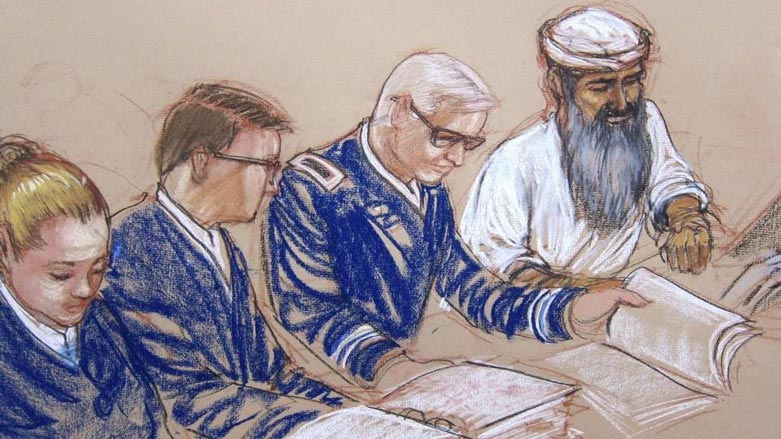A Kurd in al-Qaida’s Leadership
Most al-Qaida members are Arab, but the individual known in al-Qaida as Abdul Hadi al-Iraqi is an exception. He is a Kurd from Mosul, about 55 years old.

Most al-Qaida members are Arab, but the individual known in al-Qaida as Abdul Hadi al-Iraqi is an exception. He is a Kurd from Mosul, about 55 years old.
Now a prisoner in Guantanamo Bay, Hadi claims his real name is Nashwan al-Tamir. However, US intelligence says it is Nashwan Abd al-Razzaq Abd al-Baqi.
Hadi was a Major in the Iraqi army when he left for Afghanistan around the time Saddam Hussein invaded Kuwait. In 1996, after the government of Sudan (at US behest) expelled Osama bin Laden to Afghanistan, Hadi became an instructor in al-Qaida’s training camps. Eventually, he became the “emir” of the Arab extremists fighting there.
Hadi was captured in Gaziantep, Turkey while traveling from Afghanistan to Iraq in October 2006. He is one of 17 “high-value” prisoners at “Gitmo,” American shorthand for the US naval base in Cuba that has served as a detention facility since 2001.
Hadi’s name first appears in official documents in August 2001—a month before the 9/11 attacks—when the United Nations named him as an al-Qaida financier. However, the US charges against him relate almost entirely to his involvement in attacks on civilians and coalition troops.
The charges also suggest he was a close associate of the 9/11 mastermind, Khalid Sheikh Mohammed (KSM), also detained at Gitmo.
The charges also underscore KSM’s centrality to al-Qaida’s terrorism.
In the spring of 2002, Hadi and KSM plotted to assassinate Pakistani President Pervez Musharraf. At the same time, KSM gave Hadi $100,000 for al-Qaida operations. Hadi then directed a slew of attacks against coalition forces in Afghanistan and even against civilians working for the UN.
Media reports claim that already in the fall of 2003, Hadi began traveling regularly between Afghanistan and Iraq. In 2004, he persuaded the guerrillas in Iraq, where Abdul Musab al-Zarqawi had become the Islamic “face” of the insurgency, to adopt the name, al-Qaida in Iraq.
On Monday, yet one more pre-trial hearing was held in what has become an extended legal proceeding. It was broadcast to a viewing audience outside Washington DC, where Kurdistan24 watched it. Tedious legal wrangling consumed most of the day.
Perhaps, the most interesting and telling of the day’s events was Hadi’s protest against being escorted into the courtroom by a group of guards that included a female.
Hadi refused to move, complaining that it was against his religious beliefs to allow a strange woman to touch him.
Hadi’s lawyers appealed to the judge, a Marine colonel, to replace the female guard with a male. However, the judge refused, asserting that the matter had been settled earlier and ordered to bring Hadi into the courtroom forcefully.
After all, the Islamic State is notorious for raping helpless Ezidi women with reckless abandon. It flaunts those brutalities. Who in al-Qaida, or any other extremist organization, complains that they are against Islam?
The camera did not capture Hadi as he was being moved, but apparently, he managed to make a bit of a scuffle out of it. Once in the courtroom, he complained he had been hurt. “You can see the blood in my hands and my wrists,” he protested.
There was no serious harm, though. One of his lawyers later explained Hadi did not appear as if he had been beaten. Rather, his injuries, such that they were, looked like those of a child who had fallen on the pavement and scraped itself.
Nonetheless, Hadi maintained that the struggle had so exhausted him that he could not comprehend any of the courtroom proceedings. And so he was wheeled out, shortly after he had been wheeled in.
When Kurdistan24 asked a Pentagon observer what might explain the incongruity between Hadi’s actions—which include the murder of civilians—and his outsize outrage at the prospect of being touched by a female soldier, he suggested it could be part of a legal strategy.
Perhaps, for the sake of future appeals, the defense team sought to make the government appear as callous and indifferent as they possibly could.
Of course, there is another explanation too. Perhaps, Hadi didn’t really want much to be there? After all, it was a pretty tedious day.
Editing by Delovan Barwari